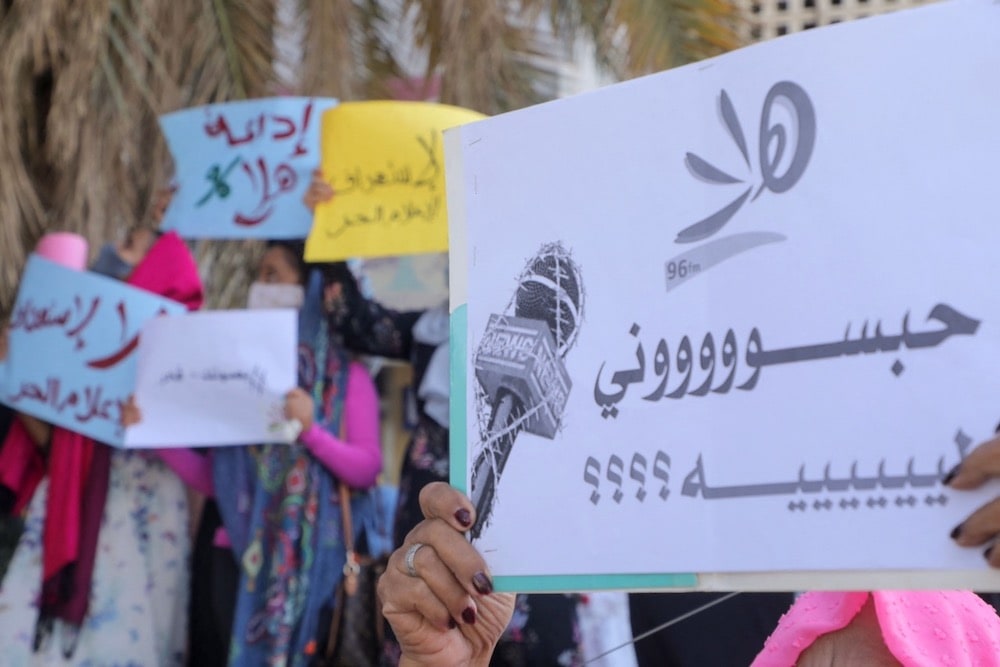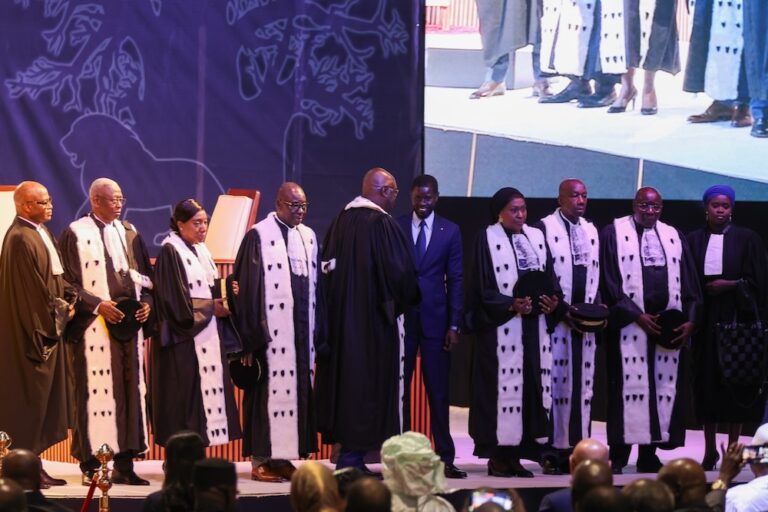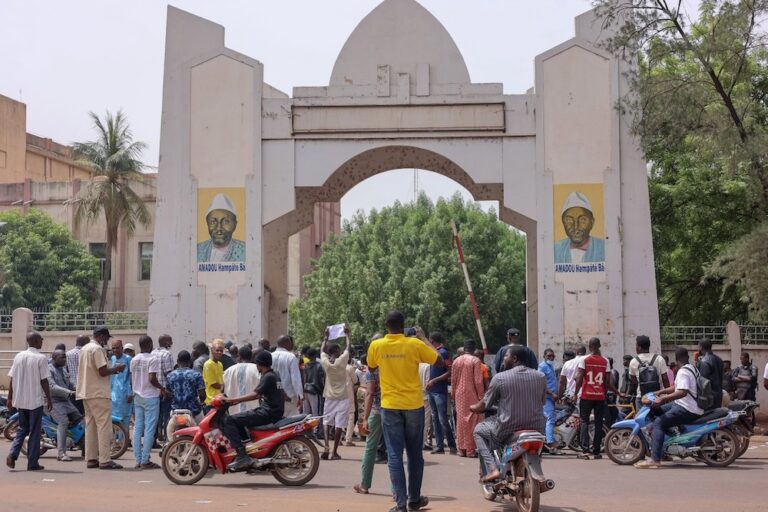Participants at the West Africa Media Excellence Conference and Awards emphasised the need to build strong alliances to effectively push back against media repression.
This statement was originally published on mfwa.org on 22 November 2023.
Despite the appreciable steady progress in democratic governance in West Africa, the region has in the last couple of years faced a drastic decline in its democratic order. The rollback has been marked by amendment of constitutions, presidential term elongations, coordinated attacks on dissenting voices and a shrinking civic space. The most worrisome has been the recent wave of military coup d’états in the Sahel, with the media and critical journalists coming under attacks.
At the 2023 edition of the West Africa Media Excellence Conference and Awards (WAMECA 2023) held under the theme: Media and Democracy in Africa, delegates called for a frontline role of the media in the fight to reverse democratic recession in Africa. They emphasised the urgent need for media organizations across the continent to build strong alliances, both at the subregional and continental levels, as a means of strengthening and amplifying their voices against the anti-democratic tendencies on the continent, especially, West Africa.
The call was part of a raft of recommendations that came out of WAMECA 2023 which was held in Ghana’s capital, Accra from the 9th to the 10th of November 2023. The conference provided convergence for stakeholders, including academics, journalists, diplomats, members of the ECOWAS High Commission, and Civil Society organizations, Government actors and other stakeholders of democracy and media from across the African continent. These stakeholders pondered the current state of democracy in Africa and the media’s crucial role in rebuilding and consolidating democratic norms.
Democratic recession in Africa
Since August 2020, there have been eight coups d’etat in Africa. As a consequence, Niger, Burkina Faso, Sudan, Mali, Guinea and Gabon, have come under the rule of military juntas which have often cited elected governments’ failure to ensure safety and security as justification for their insurrections. Amidst this, the media in African democracies have largely become extremely partisan, a fact that has eroded trust in the content that the media produce. The civic space has also become constricted, with media freedom heavily hampered.
Stakeholders speak
The mutual fate of democracy and media freedom was emphasized by stakeholders, including Media scholar and expert, Professor Kwame Karikari. In a statement at the opening of the conference, Prof Karikari regretted that “…the promise of democracy, which motivated the popular movement for constitutional governance in the early 1990s, and had free and transparent multi-party elections, human rights, freedom of expression, etc, as its principal benefits, are, today, under siege across our continent.”
WAMECA 2023 keynote speaker, Ambassador Dr. Abdel-Fatau Musah, Commissioner for Political Affairs, Peace and Security (PAPS) at the ECOWAS Commission, in a statement read on his behalf, also expressed concern at how anti-democratic forces have managed to either silence the media or gotten some media organizations on their side, as they carry out assault on the pillars of democracy with claims that democracy has failed in the subregion.
He cited junta ruled Burkina Faso, Guinea, Mali and Niger as places where the anti-democratic forces are carrying out disinformation campaigns in attempt to construct and inculcate the narrative that democracy has failed in West Africa. Ambassador Fatau called for a West African blue print on how best the media and democracy relationship can be fashioned and utilized as an agency that promotes stable democratic systems, good governance, sustainable peace and development.”
The Media’s role
According to consensus from the conference, the media’s watchdog role remains indispensable for democracy in Africa and critically so in the enterprise to rebuild and consolidate democratic gains on the continent. Stakeholders observed that governments, especially autocratic and authoritarian ones, which have the natural proclivity to want to silence dissent, go after the media. For instance, in Burkina Faso, the junta has adopted a policy of conscripting its critics, including journalists, to fight jihadist terrorists. In Mali, excerpts of the tattered state of free expression include the military junta jailing activists and demanding that all journalists join in praise singing for the regime. Regrettably in Senegal, a country that has traditionally been regarded as a press freedom champion, journalists have become an endangered species as the government of Macky Sall brutally hounds the opposition and other dissenters.
There’s still hope for democracy
In spite of the decline however, research, continues to affirm that the majority of Africans prefer democracy to any other form of government. In round 8 of Afrobarometer’s survey (2019-2021), 68% of Africans surveyed across 34 on the continent said they preferred democracy. An even larger majority, 74%, rejected military rule, while 77% and 82% rejected one-party rule and “strongman” rule respectively.
Consequently, stakeholders averred that given that the majority of Africans still prefer democracy, there is still hope to rebuild and consolidate faith in democracy, and this requires the efforts of all stakeholders, more critically, the media.
Key Recommendations
After two days of deliberations on Media and Democracy in Africa, stakeholders including governments, political parties, the ECOWAS High Commission and the media made the following key recommendations.
- The media’s role as checkmate of government should be bolstered as this is an indispensable way of keeping duty bearers under the watchful eyes of the citizens. However, as the media in the various countries are weak on their own, stakeholders advised that active collaboration be forged among media organizations across the continent as a way of bolstering their voices for a stronger effect. Media organizations across the subregion should also build alliances that improve their watchdog role for democracy and strengthen their voices against anti-democratic activities. These alliances should be among media association groups with pro-democracy agenda. Such a region or continent-wide media alliance should come together and adopt a blueprint on reportage and programming that fosters the tenets and principles of democracy.
- The media should also collaborate with civil society organizations to promote educational programmes/campaigns that help citizens realize and understand their indispensable role in building the democratic culture.
- Finally, as agenda setters and influencers of public opinion, the media and journalists should wean themselves off political allegiances that skew their reportage and programming and further endangers the democratic culture and ensure professionalism in their work.
WAMECA 2023 Supporters
WAMECA 2023 was supported by the US Embassy in Accra, the West Africa Democracy Solidarity Network (WADEMOS) and OXFAM in Ghana. It was also supported by MTN Ghana and Stanbic Bank Ghana.



